八种时态的被动语态
- 格式:doc
- 大小:76.00 KB
- 文档页数:6
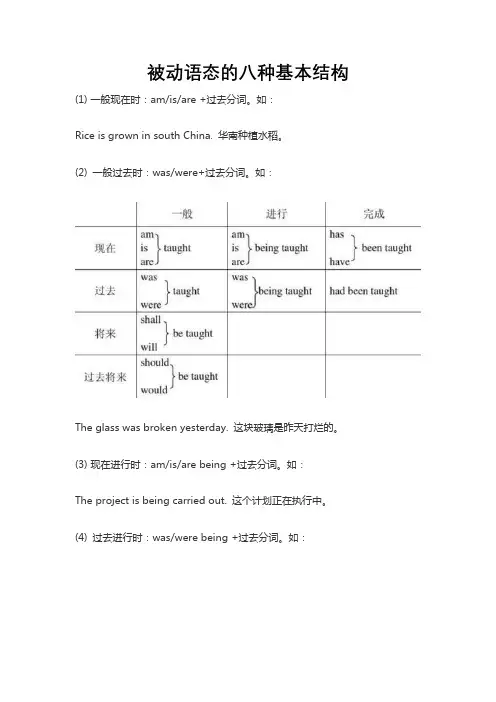
被动语态的八种基本结构(1) 一般现在时:am/is/are +过去分词。
如:Rice is grown in south China. 华南种植水稻。
(2) 一般过去时:was/were+过去分词。
如:The glass was broken yesterday. 这块玻璃是昨天打烂的。
(3) 现在进行时:am/is/are being +过去分词。
如:The project is being carried out. 这个计划正在执行中。
(4) 过去进行时:was/were being +过去分词。
如:This road was being built this time last year. 这条路去年这个时候还在修建。
(5) 一般将来时:will be +过去分词。
如:The cars will be sent abroad by sea. 这些汽车将由水路运往国外。
(6) 过去将来时:would be +过去分词。
如:The manager said the project would be completed by the end of the year. 经理说这个工程在年底前将会完成。
(7) 现在完成时:have/has been +过去分词。
如:This novel has been translated into several languages. 这本小说已被译成了几种语言。
(8) 过去完在时:had been +过去分词。
如:When I got to the theatre, I found the tickets had already been sold out. 我到达剧院时,发现票已卖完了。
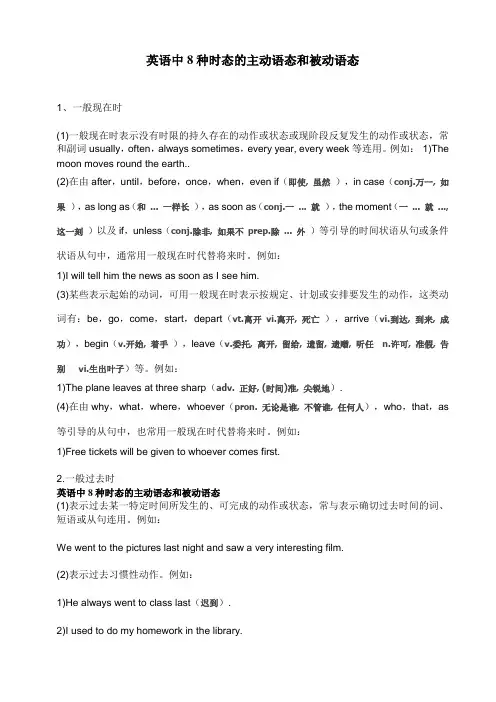
英语中8种时态的主动语态和被动语态1、一般现在时(1)一般现在时表示没有时限的持久存在的动作或状态或现阶段反复发生的动作或状态,常和副词usually,often,always sometimes,every year, every week等连用。
例如:1)The moon moves round the earth..(2)在由after,until,before,once,when,even if(即使, 虽然),in case(conj.万一, 如果),as long as(和 ... 一样长),as soon as(conj.一 ... 就),the moment(一 ... 就 ..., 这一刻)以及if,unless(conj.除非, 如果不prep.除 ... 外)等引导的时间状语从句或条件状语从句中,通常用一般现在时代替将来时。
例如:1)I will tell him the news as soon as I see him.(3)某些表示起始的动词,可用一般现在时表示按规定、计划或安排要发生的动作,这类动词有:be,go,come,start,depart(vt.离开vi.离开, 死亡),arrive(vi.到达, 到来, 成功),begin(v.开始, 着手),leave(v.委托, 离开, 留给, 遗留, 遗赠, 听任n.许可, 准假, 告别vi.生出叶子)等。
例如:1)The plane leaves at three sharp(adv. 正好, (时间)准, 尖锐地).(4)在由why,what,where,whoever(pron. 无论是谁, 不管谁, 任何人),who,that,as 等引导的从句中,也常用一般现在时代替将来时。
例如:1)Free tickets will be given to whoever comes first.2.一般过去时英语中8种时态的主动语态和被动语态(1)表示过去某一特定时间所发生的、可完成的动作或状态,常与表示确切过去时间的词、短语或从句连用。
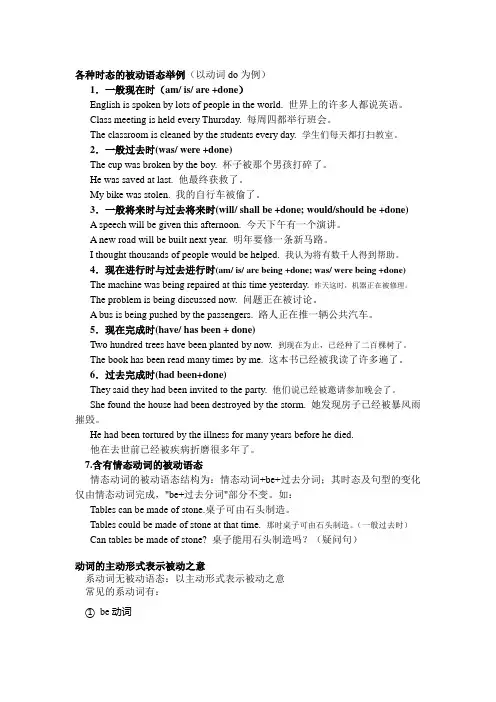
各种时态的被动语态举例(以动词do为例)1.一般现在时(am/ is/ are +done)English is spoken by lots of people in the world. 世界上的许多人都说英语。
Class meeting is held every Thursday. 每周四都举行班会。
The classroom is cleaned by the students every day. 学生们每天都打扫教室。
2.一般过去时(was/ were +done)The cup was broken by the boy. 杯子被那个男孩打碎了。
He was saved at last. 他最终获救了。
My bike was stolen. 我的自行车被偷了。
3.一般将来时与过去将来时(will/ shall be +done; would/should be +done)A speech will be given this afternoon. 今天下午有一个演讲。
A new road will be built next year. 明年要修一条新马路。
I thought thousands of people would be helped. 我认为将有数千人得到帮助。
4.现在进行时与过去进行时(am/ is/ are being +done; was/ were being +done) The machine was being repaired at this time yesterday. 昨天这时,机器正在被修理。
The problem is being discussed now. 问题正在被讨论。
A bus is being pushed by the passengers. 路人正在推一辆公共汽车。
5.现在完成时(have/ has been + done)Two hundred trees have been planted by now. 到现在为止,已经种了二百棵树了。
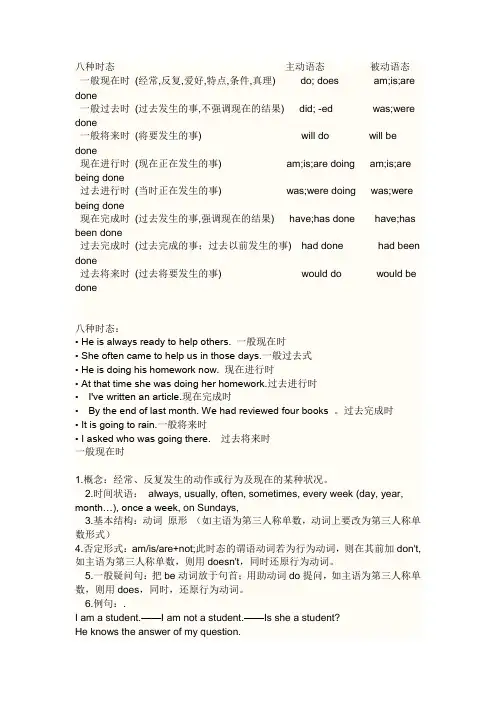
八种时态主动语态被动语态一般现在时(经常,反复,爱好,特点,条件,真理) do; does am;is;are done一般过去时(过去发生的事,不强调现在的结果) did; -ed was;were done一般将来时(将要发生的事) will do will be done现在进行时(现在正在发生的事) am;is;are doing am;is;are being done过去进行时(当时正在发生的事) was;were doing was;were being done现在完成时(过去发生的事,强调现在的结果) have;has done have;has been done过去完成时(过去完成的事;过去以前发生的事) had done had been done过去将来时(过去将要发生的事) would do would be done八种时态:• He is always ready to help others. 一般现在时• She often came to help us in those days.一般过去式• He is doing his homework now. 现在进行时• At that time she was doing her homework.过去进行时• I've written an article.现在完成时• By the end of last month. We had reviewed four books 。
过去完成时• It is going to rain.一般将来时• I asked who was going there. 过去将来时一般现在时1.概念:经常、反复发生的动作或行为及现在的某种状况。
2.时间状语:always, usually, often, sometimes, every week (day, year, month…), once a week, on Sundays,3.基本结构:动词原形(如主语为第三人称单数,动词上要改为第三人称单数形式)4.否定形式:am/is/are+not;此时态的谓语动词若为行为动词,则在其前加don't,如主语为第三人称单数,则用doesn't,同时还原行为动词。

八种时态主动语态被动语态一般现在时(经常,反复,爱好,特点,条件,真理) do; does am;is;are done一般过去时(过去发生的事,不强调现在的结果) did; -ed was;were done一般将来时(将要发生的事) will do will be done现在进行时(现在正在发生的事) am;is;are doing am;is;are being done过去进行时(当时正在发生的事) was;were doing was;were being done现在完成时(过去发生的事,强调现在的结果) have;has done have;has been done过去完成时(过去完成的事;过去以前发生的事) had done had been done过去将来时(过去将要发生的事) would do would be done八种时态:• He is always ready to help others. 一般现在时• She often came to help us in those days.一般过去式• He is doing his homework now. 现在进行时• At that time she was doing her homework.过去进行时• I've written an article.现在完成时• By the end of last month. We had reviewed four books 。
过去完成时• It is going to rain.一般将来时• I asked who was going there. 过去将来时一般现在时1.概念:经常、反复发生的动作或行为及现在的某种状况。
2.时间状语:always, usually, often, sometimes, every week (day, year, month…), once a week, on Sundays,3.基本结构:动词原形(如主语为第三人称单数,动词上要改为第三人称单数形式)4.否定形式:am/is/are+not;此时态的谓语动词若为行为动词,则在其前加don't,如主语为第三人称单数,则用doesn't,同时还原行为动词。
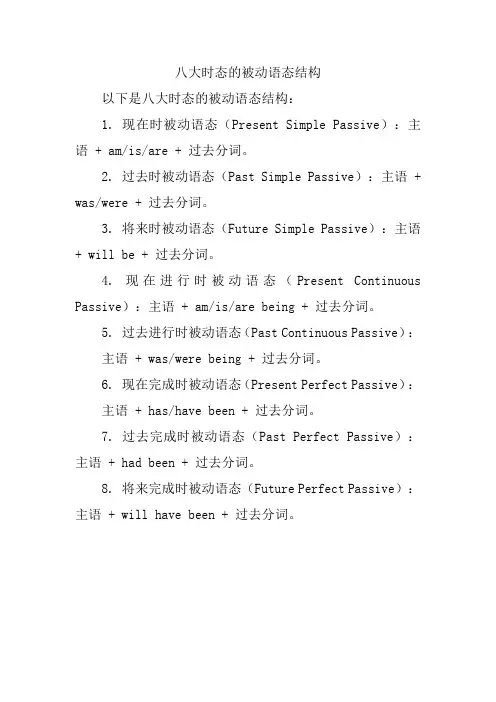
八大时态的被动语态结构
以下是八大时态的被动语态结构:
1. 现在时被动语态(Present Simple Passive):主语 + am/is/are + 过去分词。
2. 过去时被动语态(Past Simple Passive):主语 + was/were + 过去分词。
3. 将来时被动语态(Future Simple Passive):主语+ will be + 过去分词。
4. 现在进行时被动语态(Present Continuous Passive):主语 + am/is/are being + 过去分词。
5. 过去进行时被动语态(Past Continuous Passive):
主语 + was/were being + 过去分词。
6. 现在完成时被动语态(Present Perfect Passive):
主语 + has/have been + 过去分词。
7. 过去完成时被动语态(Past Perfect Passive):主语 + had been + 过去分词。
8. 将来完成时被动语态(Future Perfect Passive):主语 + will have been + 过去分词。
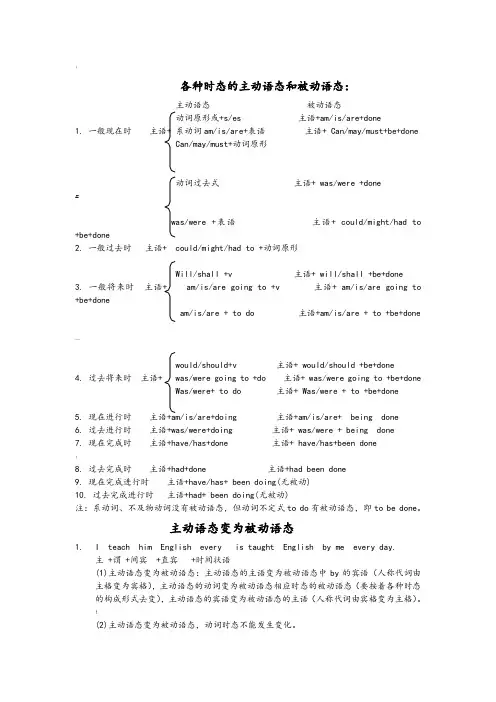
;各种时态的主动语态和被动语态:主动语态被动语态动词原形或+s/es 主语+am/is/are+done1. 一般现在时主语+ 系动词am/is/are+表语主语+ Can/may/must+be+doneCan/may/must+动词原形动词过去式主语+ was/were +done&was/were +表语主语+ could/might/had to+be+done2. 一般过去时主语+ could/might/had to +动词原形Will/shall +v 主语+ will/shall +be+done3. 一般将来时主语+ am/is/are going to +v 主语+ am/is/are going to+be+doneam/is/are + to do 主语+am/is/are + to +be+done—would/should+v 主语+ would/should +be+done4. 过去将来时主语+ was/were going to +do 主语+ was/were going to +be+doneWas/were+ to do 主语+ Was/were + to +be+done5. 现在进行时主语主语+am/is/are+ being done6. 过去进行时主语+was/were+doing 主语+ was/were + being done7. 现在完成时主语+have/has+done 主语+ have/has+been done;8. 过去完成时主语+had+done 主语+had been done9. 现在完成进行时主语+have/has+ been doing(无被动)10. 过去完成进行时主语+had+ been doing(无被动)注:系动词、不及物动词没有被动语态,但动词不定式to do有被动语态,即to be done。
主动语态变为被动语态1.I teach him English every is taught English by me every day.主 +谓 +间宾 +直宾 +时间状语(1)主动语态变为被动语态:主动语态的主语变为被动语态中by的宾语(人称代词由主格变为宾格),主动语态的动词变为被动语态相应时态的被动语态(要按着各种时态的构成形式去变),主动语态的宾语变为被动语态的主语(人称代词由宾格变为主格)。



各种时态的被动语态一、八大时态的被动语态的构成:1.一般现在时的被动语态构成:(am/is/are +done)如:I am asked to study hard. 我被请求努力学习。
This shirt is washed once a week. 这件T恤一周洗一次。
These songs are usually sung by boys. 这些歌曲通常是男生唱的。
2.一般过去时的被动语态构成:(was/were done)如:The soldier was killed, but the train was saved. 这位战士牺牲了,然而列车得救了。
Some notes were passed up to the speaker. 有人给讲演者递上来一些纸条。
3.一般将来时的被动语态构成:(shall/will be done)如:We shall be asked a lot of strange questions. 我们将被问许多怪题。
My son will be sent to school next September. 来年九月我将送我儿子去读书。
4.过去将来时的被动语态构成:(should/would be done)如:The news would be sent to him as soon as it arrived. 消息一到就会转给他的。
He told us that the new railway would be built the next year. 他告诉我新铁路将在明年修建。
5.现在完成时的被动语态构成:(has/have been done)如:The work has just been finished. 工作刚刚结束。
The old rules have been done away with by us. 旧规章已经被我们废除了。
6.过去完成时的被动语态构成:(had been done)如:By last December three ships had been built by them. 到去年十二月底他们已建造了三艘船。
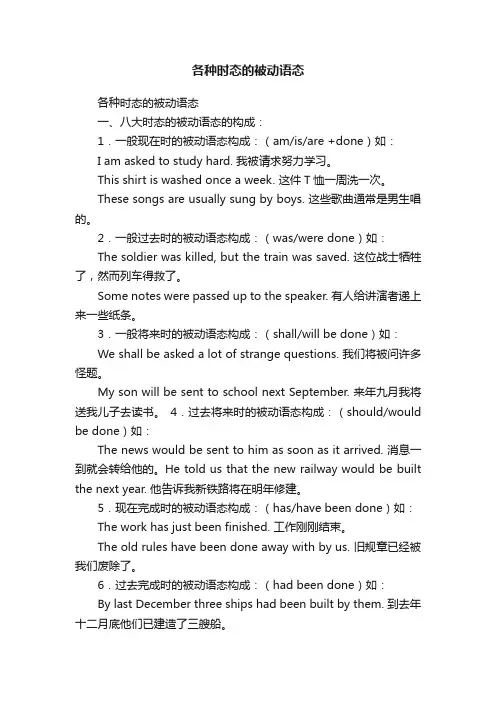
各种时态的被动语态各种时态的被动语态一、八大时态的被动语态的构成:1.一般现在时的被动语态构成:(am/is/are +done)如:I am asked to study hard. 我被请求努力学习。
This shirt is washed once a week. 这件T恤一周洗一次。
These songs are usually sung by boys. 这些歌曲通常是男生唱的。
2.一般过去时的被动语态构成:(was/were done)如:The soldier was killed, but the train was saved. 这位战士牺牲了,然而列车得救了。
Some notes were passed up to the speaker. 有人给讲演者递上来一些纸条。
3.一般将来时的被动语态构成:(shall/will be done)如:We shall be asked a lot of strange questions. 我们将被问许多怪题。
My son will be sent to school next September. 来年九月我将送我儿子去读书。
4.过去将来时的被动语态构成:(should/would be done)如:The news would be sent to him as soon as it arrived. 消息一到就会转给他的。
He told us that the new railway would be built the next year. 他告诉我新铁路将在明年修建。
5.现在完成时的被动语态构成:(has/have been done)如:The work has just been finished. 工作刚刚结束。
The old rules have been done away with by us. 旧规章已经被我们废除了。
中考英语各种时态的被动语态举例知识点总结各种时态的被动语态举例一般地讲,被动语态可用于英语的各种时态。
为了能准确地运用被动语态,重点是要掌握be动词的各种时态变化。
各种时态的被动语态举例如下:1、一般现在时的被动语态. am / is / are + 动词的过去分词Our classroom is cleaned every day.This car is made in China.2、一般过去式的被动语态: was / were + 动词的过去分词His desk was cleaned just now.The station was built in 1928.3、现在进行时的被动语态: am / is / are + being + 动词的过去分词A new factory is being built in our city now.Some trees are being cut down in the park.4、过去进行时的被动语态: was / were + being + 动词的过去分词A new factory was being built in our city at that time.Some babies were being looked after by Miss Chen last year.5、一般将来时的被动语态:(A) will / shall + be + 动词的过去分词(B) am / is / are + going to be +动词的过去分词.Some new factories will be built in our city this year.Your watch is going to be mended in an hour.6、过去将来时的被动语态: (1).would / should + be + 动词的过去分词(2).was / were +going to be + 动词的过去分词.She said that some new factories would be built soon in our city.He thought that your watch was going to be mended after an hour.7、现在完成时的被动语态:have / has + been + 动词的过去分词Some new factories have been built in the city since last year.Your watch has been mended already.8、过去完成时的被动语态:had + been + 动词的过去分词He said that some new factories had been built in the city.I didn’t know that my watch had been mended .9、含情态动词的被动式:can/may/must + be + done例如:He can not be found. / I must be paid for this.。
动词的语态:主动语态和被动语态被动语态的基本结构:Be + done(过去分词)1、一般现在时:(主动语态)I help you.发出者动词承受者变为被动语态:Do——am/is/are doneYou are helped by me.承受者谓语发出者2、一般过去时的被动:did——was/were done(I helped you.-每个例子可让学生自己先尝试变被动,再给答案)3、一般将来时的被动:Will do——will be done(I will help you.-)4、现在进行时的被动:Am/is/are doing ——Am/is/are being done(I am helping you.-)5、过去进行时的被动:Was/were doing——Was/were being done(I was helping you.-)6、现在完成时的被动:Have done——have been done (I have helped you.-)7、过去完成时的被动:Had done——had been done (I had helped you.-)8、过去将来时的被动:Would do ——would be done (I would help you.-)答案:2、You were helped by me.3、You will be helped by me.4、You are being helped by me.5、You were being helped by me.6、You have been helped by me.7、You had been helped by me.8、You would be helped by me.。
各种时态的被动语态构成一般现在时: S + am/is /are +Vpp 一般过去时: S + was/were +Vpp 一般将来时: S+ will/shall/is going to+be+ Vpp 过去将来时: S+would+be +Vpp现在进行时: S+ am/is/are + being + Vpp过去进行时: S+ was/were + being+ Vpp现在完成时: S+ have/has + been+ Vpp 过去完成时: S +had +been + Vpp情态动词: S+ can/may/must/should + be+ Vpp1.watch / let / have / hear/ see /notice/help sb + V. 用于被动语态时,to 还原。
2.只有及物动词才有被动语态,不及物动词则没有被动语态。
但有些不及物动词后面跟上介词或副词后,变成一个动词短语,相当于一个及物动词,就可以形成被动语态。
3. 没有被动语态的词,表示状态或特征的及物动词如cost, fit, have, suit等没有被动形式,另外,像happen = take place, break out(爆发),break down(坏了) result from(缘于),belong to, consist of等只用主动语态,而不用被动语态4. 大多数系动词:be , feel (摸起来),sound(听起来),smell(闻起来),taste(尝起来),look(看起来),等词无被动语态,它们的主动形式表示被动意义。
5. 被动语态中,修饰动词的副词放在be形式之后,本身与动词构成词组的位置不变。
E.g. a. The baby is well looked after by the man. / The baby is well taken care of by the man. b. The film is thought highly of by these people. 1. (10年高考I 32题)The discovery of gold in Australia led thousands to believe that a fortune ____ . A. is made B. would make C. was to be made D. had made2. (10年高考II15题)Linda, make sure that the tables ___ before the guests arrive.A. be setB. setC. are setD. are setting3. (09年高考I 26题)His sister left home in 1998, and ____ since.A. had not been heard ofB. has not been heard ofC. had not heard ofD. has not heard of4. (09年高考II 8题)Progress ____ so far very good and we are sure that the work will be finished on time. A. was B. had been C. has been D. will be5. (08年高考I 9题)The wet weather will continue tomorrow, when a cold front ___ to arrive.A. is expectedB. is expectingC. expectsD. will be expected6. (07年高考I 35题) The flowers were so lovely that they _____ in no time.A. soldB. had been soldC. were soldD. would sell7. (06年高考I 29题) The water _____ cool when I jumped into the pool for morning exercise.A. was feltB. is feltC. feltD. feels8.(06年高考II 31题) Eliza remembers everything exactly as if it _____ yesterday.A. was happeningB. was happenedC. had happenedD. happened9. (05年高考I 33题) The hero’s story _____ differently in the newspapers.A. was reportedB. was reportingC. reportsD. reported10. (04年高考I 28题) Sarah, hurry up. I’m afraid you can’t have time to ____ before theparty. A. get changed B. get change C. get changing D. get to change 11. (04年高考II 34题) According to the art dealer, the painting ____ to go for at least amillion dollars. A. is expected B. expects C. expected D. is expecting12. (04年高考III 25题) --- The window is dirty. ----- I know. It ____ for weeks.A. hasn’t cleanedB. didn’t cleanC. wasn’t cleanedD. hasn’t been cleaned13. (03年高考30题) Why don’t you put the meat in the fridge? It will ___ fresh for severaldays. A. be stayed B. stay C. be staying D. have stayed14. All those old buildings ______ down tomorrow.A. will be knockedB. will knockC. will have knockedD. knock15. Every possible means ___ to prevent the air pollution, but the sky is still not clear.A. is usedB. are usedC. has been usedD. have been used16. It is said that a new robot ____by him in a few days.A. designedB. has been designedC. will be designedD. will have been designed17. Selecting a mobile phone for use is no easy task because technology _____ so rapidly.A. is changingB. has changedC. will have changedD. will change18. They ___ day and night.A. are made workB. are made to workC. made to be workedD. are making to work19. Dinosaurs ____ about 65 million years ago.A. were disappearedB. are disappearedC. disappearedD. disappear20.The dog ____ the big tree, or it’ll run away.A. has to tie itB. must be tied onC. should tie toD. should be tied to21. - __ the sports meet might be put off. - Yes, it all depends on the weather.A. I’ve been toldB. I’ve toldC. I’m toldD. I told22. It is said that pandas _____ in our country year after year.A. are being disappearedB. are disappearingC. will be disappearedD. will disappear23. The accident ______ last week.A. was happenedB. happenedC. is happenedD. are happened24. His Selected Poems _______ in 1970.A. were publishedB. was publishedC. is publishedD. has been published25. That big room _____ for meetings.A. usesB. shall useC. is usingD. can be used26. With more forests being destroyed, huge quantities of good earth ______ eachyear. A. is washing away B. is being washed awayC. are washing awayD. are being washed away27. The radar sets _____ for a long time without any trouble.A. have been runningB. have been runC. have runD. were running28. Do you remember _____ to Dr. Henry during your last visit?A. to be introducedB. being introducedC. having introducedD. to have introduced II. 单句改错:1. Many new buildings were built since 2000.2. Look! A frog is swallowed by a snake over there.3. Great changes have been taken place in my hometown.4. This book is worth being read.5. The baby is being taken care by the parents.6. The boy was made stay at home doing his homework.。
八种时态主动语态被动语态一般现在时(经常,反复,爱好,特点,条件,真理) do; does am;is;are done一般过去时(过去发生的事,不强调现在的结果) did; -ed was;were done一般将来时(将要发生的事) will do will be done现在进行时(现在正在发生的事) am;is;are doing am;is;are being done过去进行时(当时正在发生的事) was;were doing was;were being done现在完成时(过去发生的事,强调现在的结果) have;has done have;has been done过去完成时(过去完成的事;过去以前发生的事) had done had been done过去将来时(过去将要发生的事) would do would be done八种时态:• He is always ready to help others. 一般现在时• She often came to help us in those days.一般过去式• He is doing his homework now. 现在进行时• At that time she was doing her homework.过去进行时• I've written an article.现在完成时• By the end of last month. We had reviewed four books 。
过去完成时• It is going to rain.一般将来时• I asked who was going there. 过去将来时一般现在时1.概念:经常、反复发生的动作或行为及现在的某种状况。
2.时间状语:always, usually, often, sometimes, every week (day, year, month…), once a week, on Sundays,3.基本结构:动词原形(如主语为第三人称单数,动词上要改为第三人称单数形式)4.否定形式:am/is/are+not;此时态的谓语动词若为行为动词,则在其前加don't,如主语为第三人称单数,则用doesn't,同时还原行为动词。